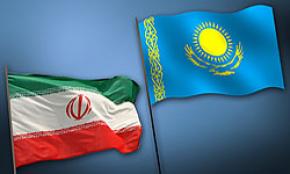ID :
179172
Sun, 05/01/2011 - 15:10
Auther :
Shortlink :
https://www.oananews.org//node/179172
The shortlink copeid
Iranian, Kazakh Officials Stress Activation of Joint Security Committee

TEHRAN, May 1 (FNA)- Tehran and Astana are rigid about activating the two countries' joint security committee, a senior Iranian Interior Ministry official announced on Sunday.
Iran's Deputy Interior Minister Ali Abdollahi announced here today that the issue was underlined during his recent meeting with Kazakh Interior Minister Kalmukhanbet Kasymov in Astana.
"During the trip, we held a meeting with the Kazakh interior minister and had extensive talks on bilateral relations and the two countries' agreements," Abdollahi told FNA.
"We also underscored activation of a security committee between Iran and Kazakhstan which has been stressed in a mutual agreement signed by the two countries earlier," he added.
Abdollahi further mentioned that during the visit to Astana, the Iranian and Kazakh officials also discussed various aspects of mutual cooperation in fighting drugs and terrorism.
The Iranian deputy interior minister was in Astana to attend an Interior Ministers Meeting of the Shanghai Cooperation Organization.
Interior and public security ministers of the SCO member states held their second meeting in Astana on Friday, pledging for closer cooperation in law enforcement and security.
The meeting, hosted by Kasymov, gathered Chinese Public Security Minister Meng Jianzhu, interior ministers from Russia, Kyrgyzstan, Uzbekistan and a deputy interior minister from Tajikistan.
The Shanghai Cooperation Organization is an intergovernmental organization which was founded in 2001 in Shanghai, China, by the heads of states of China, Kazakhstan, Kyrgyzstan, Russia, Tajikistan and Uzbekistan.
Iran currently holds an observer status in the group and applied for full membership in a request filed on March 24, 2008.
SCO member governments include China, Kazakhstan, Kyrgyzstan, Russia, Tajikistan and Uzbekistan, as well as four formally designated observer countries, namely India, Iran, Mongolia, and Pakistan.
Iran lies on a major drug route between Afghanistan and Europe as well as the Persian Gulf states. Since the 1979 Islamic Revolution, the Iranian police have lost more than 3700 of their personnel in the country's combat against narcotics.
Eastern Iran borders Afghanistan, which is the world's number one opium and drug producer. Iran's geographical position has made the country a favorite transit corridor for drug traffickers who intend to smuggle their cargoes from Afghanistan to drug dealers in Europe.
Each year, the Iranian government spends hundreds of millions of dollars erecting barriers along the borders with Pakistan and Afghanistan and pumping resources into checkpoints.
Iran's Deputy Interior Minister Ali Abdollahi announced here today that the issue was underlined during his recent meeting with Kazakh Interior Minister Kalmukhanbet Kasymov in Astana.
"During the trip, we held a meeting with the Kazakh interior minister and had extensive talks on bilateral relations and the two countries' agreements," Abdollahi told FNA.
"We also underscored activation of a security committee between Iran and Kazakhstan which has been stressed in a mutual agreement signed by the two countries earlier," he added.
Abdollahi further mentioned that during the visit to Astana, the Iranian and Kazakh officials also discussed various aspects of mutual cooperation in fighting drugs and terrorism.
The Iranian deputy interior minister was in Astana to attend an Interior Ministers Meeting of the Shanghai Cooperation Organization.
Interior and public security ministers of the SCO member states held their second meeting in Astana on Friday, pledging for closer cooperation in law enforcement and security.
The meeting, hosted by Kasymov, gathered Chinese Public Security Minister Meng Jianzhu, interior ministers from Russia, Kyrgyzstan, Uzbekistan and a deputy interior minister from Tajikistan.
The Shanghai Cooperation Organization is an intergovernmental organization which was founded in 2001 in Shanghai, China, by the heads of states of China, Kazakhstan, Kyrgyzstan, Russia, Tajikistan and Uzbekistan.
Iran currently holds an observer status in the group and applied for full membership in a request filed on March 24, 2008.
SCO member governments include China, Kazakhstan, Kyrgyzstan, Russia, Tajikistan and Uzbekistan, as well as four formally designated observer countries, namely India, Iran, Mongolia, and Pakistan.
Iran lies on a major drug route between Afghanistan and Europe as well as the Persian Gulf states. Since the 1979 Islamic Revolution, the Iranian police have lost more than 3700 of their personnel in the country's combat against narcotics.
Eastern Iran borders Afghanistan, which is the world's number one opium and drug producer. Iran's geographical position has made the country a favorite transit corridor for drug traffickers who intend to smuggle their cargoes from Afghanistan to drug dealers in Europe.
Each year, the Iranian government spends hundreds of millions of dollars erecting barriers along the borders with Pakistan and Afghanistan and pumping resources into checkpoints.





